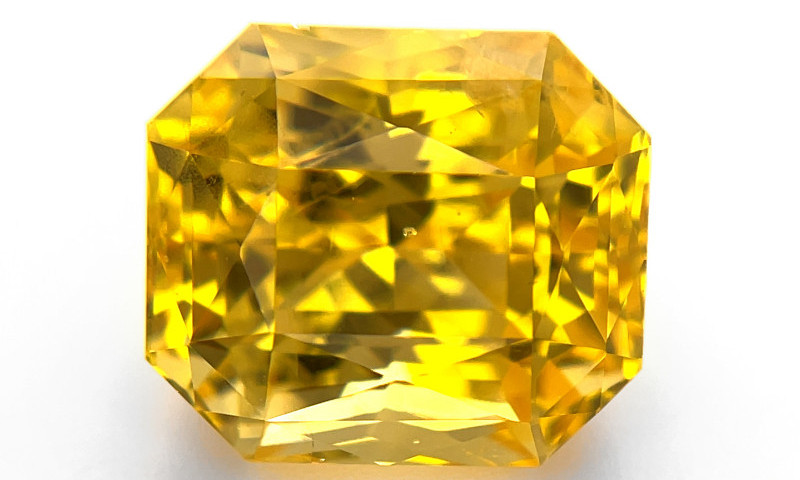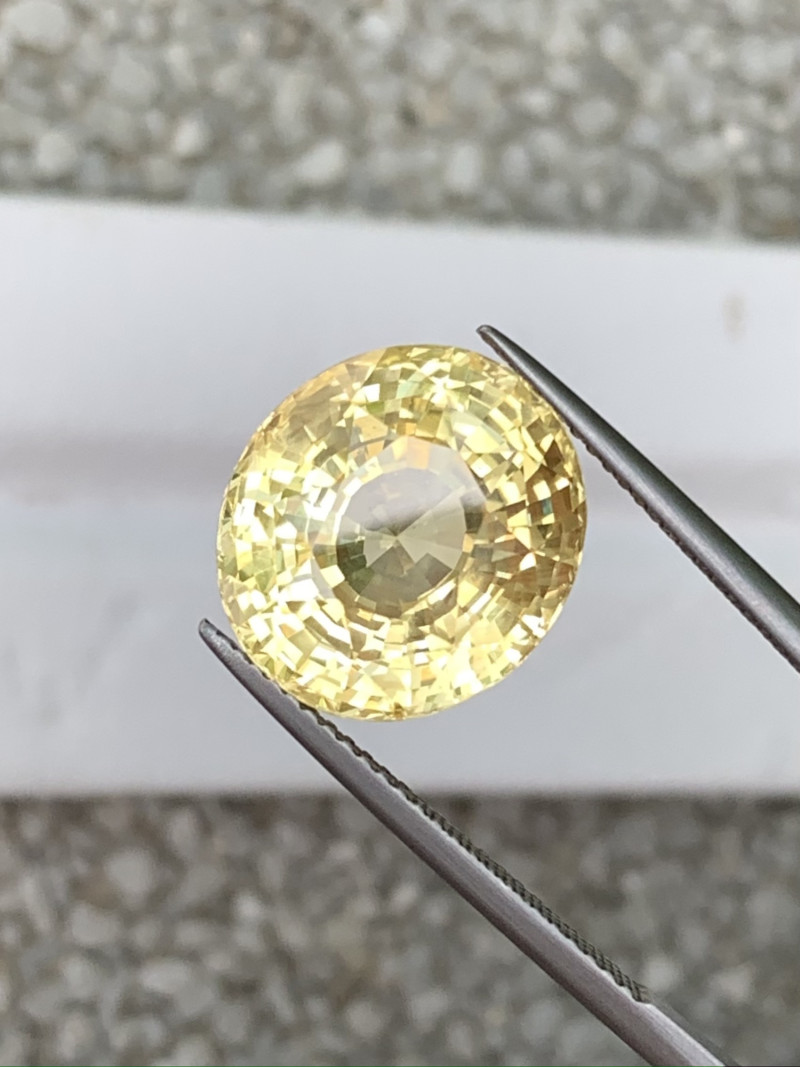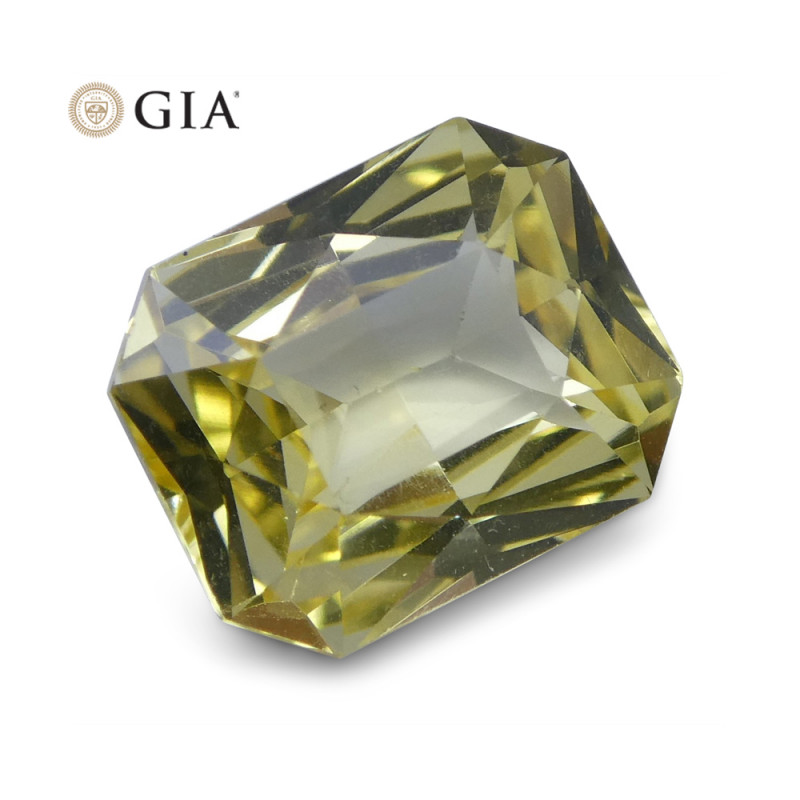
Yellow Sapphire Gemstone: Properties, Meanings, Value & More
 Yellow sapphire is a type of sapphire gemstone found in various shades of yellow, including the coveted canary yellow. The color of these stones can resemble that of yellow diamonds.
Yellow sapphire is a type of sapphire gemstone found in various shades of yellow, including the coveted canary yellow. The color of these stones can resemble that of yellow diamonds.
A common nickname for yellow sapphire is “Pukhraj,” which is significant in various south Asian cultures, mythology, and astrology.
In the jewelry realm, yellow sapphires are more affordable than blue or Padparadscha sapphires. This sapphire color is also increasing in value, making it a great investment. Plus, its durability makes it one of the best types of stones for rings.

About Yellow Sapphire Stone
Yellow sapphires are precious gemstones that can resemble other well-known gems like topaz. This resemblance has led to trade names like “King Topaz” or “Oriental Topaz,” but these misleading names are against FCC guidelines.
Other names for yellow sapphire include:
Pukhraj (a Hindi name we’ll cover later)
Wisdom Stone
Jupiter Stone
All sapphires are September birthstones, but yellow sapphire also serves as a November birthstone beside yellow topaz and citrine. Sapphires are traditional 5th, 45th, and 75th wedding anniversary gems and zodiac stones for the sign Taurus.
Yellow Sapphire Specifications & Characteristics
Yellow sapphire is a variety of corundum, an aluminum oxide mineral. Iron impurities cause the yellow color. Sapphires often form as flat-ended prismatic, barrel-shaped, or bipyramidal crystals.
You can identify some yellow sapphires with the right gemological tools. Using a spectrometer, you’ll see three absorption lines merging at 4500 in most sapphires. Natural yellow to sapphires don’t have diagnostic lines, but natural Australian yellow sapphires will show lines at 4500, 4600, and 4700.
Certain inclusions (parallel bunches of diaspore or rutile) can create yellow “star sapphires.” This effect is called asterism, an optical phenomenon creating star-like rays of reflected light on the stone’s surface.
You can differentiate yellow sapphires from yellow topaz or citrine by hardness. On the Mohs mineral hardness scale, topaz ranks at 8 while citrine ranks at 7, both softer than yellow sapphire.
Speaking of, here’s an overview of yellow sapphire’s mineral properties:
Mohs hardness: 9
Color: Shades of yellow with possible orange, brown, or green undertones; Parti-colored specimens can be yellow & green or yellow & blue; Color zoning may be present
Crystal structure: Hexagonal (trigonal)
Luster: Vitreous (glassy) to adamantine
Transparency: Transparent to opaque
Refractive index: 1.76-1.77
Density: 3.98-4.10
Cleavage: None
Fracture: Conchoidal
Streak: White
Luminescence: Fluorescence & X-ray colors present; Distinct apricot in LW-UV & X-ray, weak yellow-orange in SW-UV (natural); Very weak red in SW-UV (synthetic)
Pleochroism: Present & very strong in medium yellow to pale yellow
Birefringence: 0.008-0.009
Optical effects: Sometimes asterism
Dispersion: 0.018
Mineralogy aside, what does a yellow sapphire symbolize?
Yellow Sapphire Meaning & History
Yellow sapphires are nicknamed the “wisdom stone” and thus symbolize spiritual wisdom and intelligence. They also represent prosperity, joy, and celestial connection, which brings us to Pukhraj.
 Pictured above: Navaratna gemstone ring | Image credit: Pradeep717, Creative Commons Attribution-Share Alike 4.0 International license
Pictured above: Navaratna gemstone ring | Image credit: Pradeep717, Creative Commons Attribution-Share Alike 4.0 International license
Yellow Sapphire in Hindi: Pukhraj & Navaratna
In India, yellow sapphire is called “Pukhraj” or “Pukhraj ratna” meaning “yellow jewel” — though some translations interpret “Pukhraj” as referring to topaz or citrine. Similar terms include:
Pushkaraj
Push Raja
Peetmani
Kanakapushyaragam
Regardless, Pukhraj is tied to the planet Jupiter in Vedic (Hindu) astrology. Jupiter is the most beneficial planet in Hindu astrology, and those who wear Pukhraj are said to attract Jupiter’s benefits for wealth, good luck, and success.
Also nicknamed “Jupiter stone,” yellow sapphire is one of the nine planetary gems that make up the Navaratna.
Navaratna is Sanskrit for “nine gems” and describes a cultural jewelry style containing nine gemstones, each representing one of our solar system’s planetary bodies. This jewelry is not only prevalent in Hinduism but also Buddhism, Sikhism, and Jainism.
The meaning or power of Navaratna jewelry varies from symbolizing status to representing the Navagrahas, or “nine celestial gods,” of Hindu astrology.
The sapphire color and quality also matters. Blue sapphire represents Saturn, or “Shani.” Some Asian cultures believe that only flawless gems are beneficial in the Navaratna, with flawed gems being harmful.
Additionally, the best finger to wear a yellow sapphire ring (according to Hindu astrologers) is the right index finger because this finger, called Tarjani in Sanskrit, is ruled by Jupiter.

History
The word “sapphire” has two possible etymological roots. One is the Ancient Greek sappheiros, meaning “blue stone,” relating to “sapphire” describing lapis lazuli and other blue gemstones until the Middle Ages.
Another possible origin is the Sanskrit śanipriya, meaning “sacred to Saturn,” relating to blue sapphire’s association with Saturn in Hindu astrology.
Like many sapphires, the first known yellow sapphires came from Sri Lanka. Sapphire mining in Sri Lanka goes back over 2,000 years.
From the 1960s onward, Australia has become a major sapphire source. While most are blue, Australian yellow sapphires have notably bright coloring. A rare few are bi-colored (or parti-colored) in yellow and green or yellow and blue.
The yellow-and-green ones are sometimes called “wattle” sapphires. Wattle (or mimosa) is Australia’s national flower. It has golden-yellow flowers and olive green leaves.
Shifting back to the metaphysical, what is the power of yellow sapphire?

Yellow Sapphire Healing Properties
Yellow sapphire, like any gem, can be a healing stone. The crystal joins other yellow gemstones in offering greater hope, success, and joy.
Additionally, yellow gemstones are great solar plexus chakra stones, balancing the energy center so you feel confident and in control.
What are the benefits of yellow sapphire physically and emotionally?
Physical Healing
Commonly purported yellow sapphire benefits for physical wellbeing include treating or improving:
Detoxification
Lymphatic system function
Insomnia
Concentration
Emotional Healing
Yellow sapphires can bring emotional balance and self-awareness. The stone is believed to encourage ingenuity and ambitious pursuits.
Additionally, yellow sapphire is said to lower anxiety, increase relationship satisfaction, and strengthen decision-making.

Yellow Sapphire Gemstone Properties
Yellow sapphire’s value depends on its color, cut, clarity, carat weight, treatments, and origin (natural vs. synthetic).
Color
The best shade of yellow sapphire is a bright, medium-toned canary yellow, which is valued both as a gem and for astrology purposes. Lemon-yellow hues are also valuable.
Iron impurities often cause the yellow color, with higher iron meaning greater saturation. However, radiation (be it natural or lab-induced) can also create the sunny hues.
Expanding on that, experts at the Gemological Institute of America (GIA) have studied yellow sapphire’s light stability (tendency to fade with prolonged sunlight exposure).
They found 7 types of yellow sapphire related to the material’s origin (natural vs. synthetic), color-causing agent, and stability:
Type 1: Natural; Color center; Light-stable
Type 2: Natural or irradiation-treated; Color center; Fades
Type 3: Natural; Contains iron & unheated; Light-stable
Type 4: Natural; Contains iron & heated; Light-stable
Type 5: Natural or synthetic; Diffusion-treated; Light-stable
Type 6: Synthetic; Untreated; Light-stable
Type 7: Synthetic; Irradiation-treated; Fades
Fascinatingly, Type I yellow sapphires may fade when heated, but exposure to light will bring the color back.
Cut
Many yellow sapphires are faceted, and virtually any shape is possible. The best cuts (proportional, symmetric, no dark areas) command the highest prices.
Yellow star sapphires must be cut as cabochons to display their “star” properly. Lower-quality specimens may also be cut as cabochons are carved.
Clarity
Sapphires have a Type II colored gemstone clarity grade, meaning some small, visible inclusions are expected.
Common inclusions include:
Hexagonal color banding or growth lines
Fingerprints
Zircon crystals, often with dark “halo” fractures
Compared to blue or pink sapphires, yellow sapphires generally have fewer inclusions.

Carat Weight
Yellow sapphire crystals can be quite large, lending to high-carat gems. Gems over 2 carats generally only slightly increase in price-per-carat rates.
Some of the largest yellow sapphires include:
The Centenary Stone: 2,020-carat Australian yellow sapphire found in 1979,, stolen in 1980, but recovered in 1986
“Willows” Sapphire: 217.5-carat Australian yellow sapphire found in 1946 in the Willows Gemfields of Queensland
The Autumn Glory: 103.5-carat Australian yellow to orange sapphire found in 1993 but missing since being sent to the USA
The Tomahawk Tiger: 82.4-carat Australian yellow sapphire with distinct color banding
Another notable yellow sapphire is in Bollywood actress Madhuri Dixit Nene’s ring that she’s worn since becoming an actress, similar to many Bollywood stars.
Treatments
High-quality, natural yellow sapphires are pretty rare, so jewelers may make up the difference via treatments or synthetic stones. Heat and irradiation treatments are common to improve coloring, but irradiated gems can fade from sunlight exposure. Diffusion is another less common treatment.
Sometimes, milky-white Sri Lankan sapphires called “geudas” are heated to become blue, yellow, or orange.
Synthetics: How to Identify Original Yellow Sapphire
Synthetic yellow sapphire is created in a lab but has the same chemical and physical make-up of natural material. These sapphires are more flawless than natural ones and are a more budget-friendly, sustainable option.
Less desirable are simulants — different gems or other materials used to imitate yellow sapphires.
How can I tell if my yellow sapphire is real? Some indicators of a fake (simulant) or lab-created sapphire are:
Gas bubbles (simulant)
Scratches (maybe simulant)
Curved striae, growth lines, and/or color-banding (synthetic)
Fingerprint inclusions (maybe synthetic)
Smoky veils (synthetic)
“Nail head” inclusions (synthetic)
Back to the real deal, how does natural yellow sapphire form?

Yellow Sapphire Formation & Sources
Corundum stones like yellow sapphire form inside metamorphic or igneous rocks.
In igneous rocks, the stone crystallizes as the rock cools from magma. Longer cooling times creates larger crystals. The igneous rock must be aluminum-rich and silica-poor, like nepheline syenites.
In metamorphic rocks, the crystals often form when ancient sea beds undergo metamorphism from hot, aluminum-rich waters.
Many times, the rocks holding sapphires wear away, allowing water to carry the gems into alluvial deposits like riverbeds.
Mining Locations
Top-quality yellow sapphires come from Sri Lanka and Myanmar. Yellow sapphires are allegedly the second most abundant type of sapphire found in Sri Lanka.
Other notable yellow sapphire sources are:
Australia
China
Madagascar
Tanzania
Thailand
Once they’re cut and sold, it’s onto the market!

Yellow Sapphire Price & Value
First, are yellow sapphires expensive? Compared to blue or Padparadscha sapphires, yellow sapphires are much more affordable, but their price ranges broadly.
Faceted yellow sapphire stone prices range from $50-$750 per carat under 2 carats and $375-$1,625 per carat over 2 carats.
Rare bi-colored Australian yellow sapphires (faceted) range from $100-$1,050 per carat at wholesale. Other Australian loose yellow sapphire gemstones go for $100-$400 per carat, with some reaching over $1,500 per carat.
Yellow star sapphires fetch $100-$300 per carat when 0.5-1 carat and $100-$500 per carat when 1-5 carats.
Yellow Sapphire Care and Maintenance
Lastly, we’ll discuss gemstone care. First, how long does yellow sapphire last? It depends.
Natural, untreated stones should last a lifetime with proper upkeep. Stones that are heavily included or fractured will be more fragile. Some jewelry is more vulnerable than others; a yellow sapphire necklace will be less vulnerable than a ring, for instance.
Still, sapphires made yellow through natural or lab-induced irradiation will fade with prolonged sunlight exposure. This is tricky, as leaving a yellow sapphire in the sunlight will deepen its color, but prolonged exposure will cause color-fading.
Unfortunately, many yellow and Padparadscha sapphires are known to fade in color, but it depends on the “type” outlined in the Color section.
The safest way to clean this stone is with a soft toothbrush, warm water, and mild soap.

Rise and Shine in Yellow Sapphire!
With options ranging from pastel lemon to vibrant golds, there’s a yellow sapphire for a variety of tastes. Whether you wear yellow sapphire as a Pukhraj ring, in Navaratna jewelry, or simply as a fashionable accessory, you’re sure to shine like the sun!
Search the Gemstone Encyclopedia
Related Auctions
Related Articles
Originally the Birthstones or gemstones were associated with a zodiac sign or the month of a individuals birth. Find out what your stone is and view the stones we have for sale
8th Feb 2021
There are dozens of quartz and chalcedony gems with various colors and patterns. Learn all about quartz properties and every type of quartz, from amethyst and agate to plasma and phantom quartz!
15th Oct 2020
Hackmanite is a pink to violet sodalite gem known for its unique color-change and luminescence. Learn why hackmanite is special, from its rare qualities to the types of hackmanite jewelry available.
28th Mar 2018
Latest Articles
Yugawaralite is a rare colorless, white, or pinkish zeolite crystal named for its discovery in Yugawara, Japan. Here we uncover the multifaceted history, properties, prices, and uses of yugawaralite.
24th Mar 2025
Simpsonite is a lesser-known mineral known on the gem market for its durability, yellow-orange color, and rarity. Discover all the properties, uses, prices, and history of simpsonite.
3rd Mar 2025
Kurnakovite is a colorless crystal related to inderite and rarely faceted but known among collectors. Explore the mineral traits, history, prices, and more in this kurnakovite guide.
17th Feb 2025
Article Categories
How To's is where you will find helpful articles from gem Rock Auctions on how to cut gemstones, select gemstones and buy gemstones.
9 Articles






